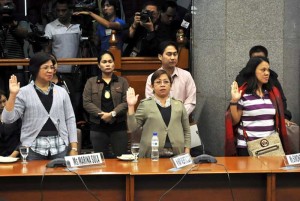Janet Lim-Napoles, the alleged mastermind of the pork barrel scheme, did not only use her employees as dummy heads of her non-governmental organizations (NGOs) or had them pose as contractors.
She also tapped them as money couriers.
Marina Sula revealed her role and that of her colleagues in the Napoles network when
she appeared before the Senate Blue Ribbon Committee on Thursday.
The committee is conducting an inquiry into the alleged misuse of the lawmakers’ Priority Development Assistance fund (PDAF).
Sula, who headed the Masaganang Ani Para sa Magsasaka Foundation Inc.(Mamfi), a nongovernment organization (NGO) set up by Napoles, said there was a time when her boss asked her to deliver a bag of money to the representative of a lawmaker.
Asked how she knew that the bag contained money, Sula said Napoles had cautioned her to be careful because there was money inside the bag.
Sula did not mention the name of the lawmaker but identified the representative as Ruby Tuazon.
It was learned that Tuazon used to be connected with former president and now Manila Mayor Joseph Estrada.
Sula is one of the six whistleblowers who testified at the Blue Ribbon hearing yesterday
The others were Gertudes Luy, Merlina Suñas, Arlene Baltazar, Monette Briones, and Benhur Luy who appered at the Senate for the second time on Thursday.
They were accompanied by Justice Secretary Leila de Lima.
Based on a Commission on Audit (COA) report, Napoles created a total of 20 NGOs.
Eight were used in the PDAF scam and the others in the Malampaya fund operation.
But the PDAF and the Malampaya fund were not Napoles’ first source of money. She used to be a supplier for the Philippine Navy and the Marines.
Suñas, a former project coordinator of Napoles, said she met Napoles while she was a civilian employee in the Navy.
She said Napoles used the Jo-Chris Trading for closing contracts with the Naval construction brigade for three years.
Using a different company, Napoles won a contract to provide the Marines with Kevlar helmets.
The firm was later dragged into a case involving the misuse of funds for the helmets.
Suñas said she quit her job at the Navy to join Napoles’ firm.
Baltazar, who was hired by Napoles as a bookkeeper, said she was also used by her boss to stand as chairman for one NGO.
“We are aware that she is well connected and we are confident that she can help us,” Baltazar said.
Senator Teofisto Guingona 3rd, head of the Blue Ribbon panel, said after the hearing the committee made significant headway in its inquiry.
“I thank the whistleblowers who presented themselves to the committee today. In so doing, you helped us—and that of our people’s—search for truth,” he said.
Guingona urged Senate President Franklin Drilon to reconsider his decision not to approve a subpoena for Napoles so the panel could come up with a comprehensive report.
In a letter to Drilon, Guingona gave the Senate chief three days to decide.
“Our options are clear. We will exercise our options but right now I’d like to wait for the letter of reconsideration,” he said.
Guingona sees no issues with the Office of the Ombudsman if the Senate summons Napoles.
Ombudsman Conchita Carpio Morales had told Drilon it was not advisable to invite Napoles because she was already facing charges in court.
But Guingona said the Ombudsman merely issued an opinion and not a ruling.
“The advice was not to the Senate, it is to Senate President Drilon. So, there is no prohibition,” he told reporters.
He assured that Drilon’s reluctance to summon Napoles will not trigger a leadership change in the Senate.
Malampaya funds
At the House of Representatives, the Makabayan bloc proposed that the P132-billion Malampaya Fund be included in the P2.268-trillion budget for 2014 to place it under Congress control.
The bloc—which groups party-list Representatives Neri Colmenares and Carlos Zarate of Bayan Muna, Luz Ilagan and Emerenciana de Jesus of Gabriela, Terry Ridon of Kabataan, Fernando Hicap of Anakpawis and Antonio Tinio of Alliance of Concerned
Teachers—embodied their proposal in House Bill 2993 which creates an Energy Development Board and mandates the transfer of Malampaya funds to the General Fund subject to congressional appropriation.
The Malampaya fund is a presidential discretionary fund sourced from the payments of oil companies Caltex and Shell to the government for the right to drill in the
Malampaya gas field off Palawan.
“The Makabayan bloc is prompted to put a stop to the Presidential power over this fund by repealing the Presidential decree and recommends that the income collected by the Department of Energy (DOE) from its service contractors be taken up as income of the General Fund so that it could be allocated to basic social services for health and education,” they said in their explanatory note.
Makabayan was referring to Presidential Decree No. 910 promulgated by the late dictator Ferdinand Marcos which authorizes the use the Malampaya funds not only to finance energy resource development and exploitation, but for other purposes as may be directed by the President.
They said COA in 2011 believed it was favorable to the government if the Malampaya funds were transferred to the unappropriated surplus and made available for appropriation by Congress.
The Supreme Court early this month temporarily stopped the releases of the funds.
With report from Llanesca T. Panti


